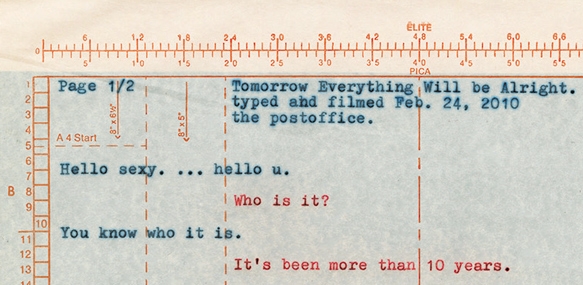Tomorrow Everything Will Be Alright
On occasion of the launch of the book on Tomorrow Everything Will Be Alright, exhibition by Lebanese artist Akram Zaatari on show at Galpão VB, a conversation revolving around Lebanese presence in art-making and the art scene in Brazil will approach the issue from a three-pronged artistic, curatorial-institutional, and academic perspective. Solange Farkas, curator of the show and Videobrasil’s director, gets together with professor and researcher Eduardo de Jesus and the awarded filmmaker and documentarist Carlos Nader, Videobrasil long term collaborator, with participation in different editions of the Contemporary Art Festival Sesc_Videobrasil, exhibiting pieces in the border of cinema and visual arts. The meeeting and book launch will take place at 3pm, at Galpão VB.
On this day, from 11am to 5pm, the Comedoro Café welcomes Al Janiah as a guest at #Galpão VB. Al Janiah is an Arab cultural and political space that offers with drinks, food and music typical of the Middle East.
The bilingual book Akram Zaatari - Tomorrow Everything Will Be Alright, illustrated with images from the exhibition, features Teté Martinho as executive editor; Celso Longo + Daniel Trench as graphic designers; and texts by curators Solange Farkas and Gabriel Bogossian, and the researcher, professor, and former editor of Visual Anthropology Review magazine, Mark R. Westmoreland. The book also includes an interview conducted by curator Moacir dos Anjos with the artist Akram Zaatari.
More about the participants of the Book Launch meeting:
Carlos Nader
Experimenting and interweaving languages from video art to documentary, Nader is an author with a strong essayistic appeal. Concerned with the complexity of contemporary Brazilian culture and its media-based dimension, he looks into certain characters—anonymous people, celebrities, and artists—for myriad traces of urban identities. Documentary in nature, Beijoqueiro (1992) was one of the most widely recognized national videos of the 1990s, due to its production’s summing up of shared features of its generation. Next he made the films Trovoada (1995), winner of the 1998 Videokunstpreis, O Fim da Viagem (1996), and Carlos Nader (1998), winner of Grande Prêmio de Cinema Brasil in 2000. The latter deconstructs the concept of autobiography, interspersing his own image with transvestites, philosophers, poets, and criminals. Throughout the 2000s, Nader concentrated his activities abroad, where he directed documentaries and created video installations for local culture centers, and took part in several festivals and collective shows. He has made several other films including: Concepção (2001), Flor da Pele (2002), Cross (2003), RBS: 50 anos da televisão no Brasil (2007), Pan-Cinema Permanente (2008), Chelpa Ferro (2009), from the Videobrasil Authors Collection series, and Eduardo Coutinho – 7 de outubro (2013). He recently won Best Brazilian Feature Documentary back-to-back at the It’s All True Festival for Homem Comum (2014) and A Paixão de JL (2015), the latter of which also won a prize at the 37th Havana Film Festival in 2016. Early on in his career, he was the editor of magazines Caos, from 1987 to 1989, and Circuit, in 1990. Carlos Nader lives and works in São Paulo.
Eduardo de Jesus
Holds a degree in social communication from PUC Minas, a master’s in communication from UFMG, and a doctorate degree in arts from ECA-USP. He is a professor at the postgraduate program in Communications at PUC Minas. He has been involved in several editions of the Videobrasil Festival and Associação Cultural Videobrasil projects. His curating history includes FIF – Festival Internacional de Fotografia (Belo Horizonte, 2013 and 2015), esses espaços (Belo Horizonte, 2010), Densidade Local, co-curated with Gunalan Nadarajan for the Festival Transitio-MX (Mexico City, 2008) and Mostra Fiat Brasil (2006). He presently publishes texts, essays, and reviews on contemporary art production.
Solange Farkas
Curator and director of Associação Cultural Videobrasil. In 1983, she created the Contemporary Art Festival Sesc_Videobrasil, of which she is chief curator, and which has grown into a landmark for art production from the Global South. She was responsible for bringing exhibits such as Sophie Calle’s (Take Care of Yourself, 2009), Joseph Beuys’ (We Are the Revolution, 2010) and Isaac Julien’s (Geopoetics, 2012), which she also curated, to Brazil. She was featured as a guest curator in the 10th Sharjah Biennial (United Arab Emirates, 2011), the 16th Cerveira Art Biennial (Portugal, 2011), the 5th Videozone: International Video Art Biennial (Israel, 2010), and the 6th Jakarta International Video Festival (Indonesia, 2013), among other events.
Highlights of her 25-year curating career include exhibits such as Contemporary Southern Hemisphere Videoart, at the 9th Ayoul Festival (Beirut, Lebanon, 1999); the Pan-African Contemporary Art Exhibition (Salvador, Brazil, 2005); La Mirada Discreta: Marcel Odenbach & Robert Cahen (Buenos Aires, Argentina, 2006); Suspensão e Fluidez (ARCO, Madri, 2007); and the Contemporary African Art Exhibition (São Paulo, Brazil, 2000), co-curated with Clive Kellner.
In 2003, she invited Akram Zaatari and Christine Tohme to organize the Lebanese art event Narrativas Possíveis (Possible Narratives) as a part of the 14th Festival. Encompassing video showings, an exhibition, and lectures, the event paved the way for Lebanese artists to be represented in the Festival in a major way. In 2015, Solange Farkas was invited to join the content committee of the UN Live Museum, the Museum for Humanity of the United Nations.
